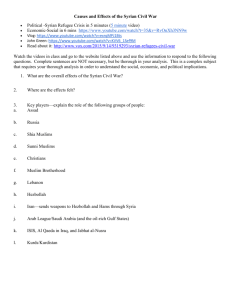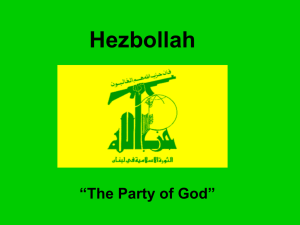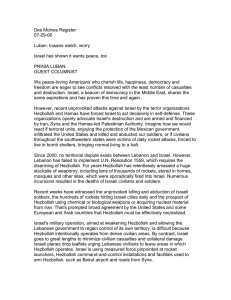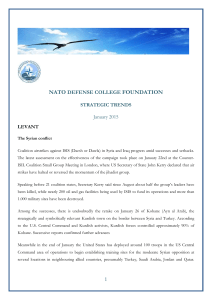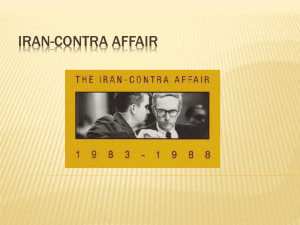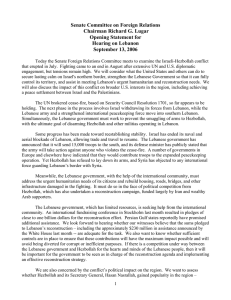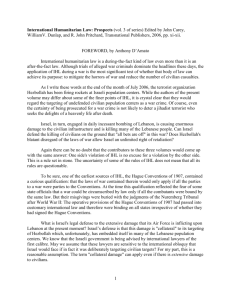American Jewish Committee
advertisement
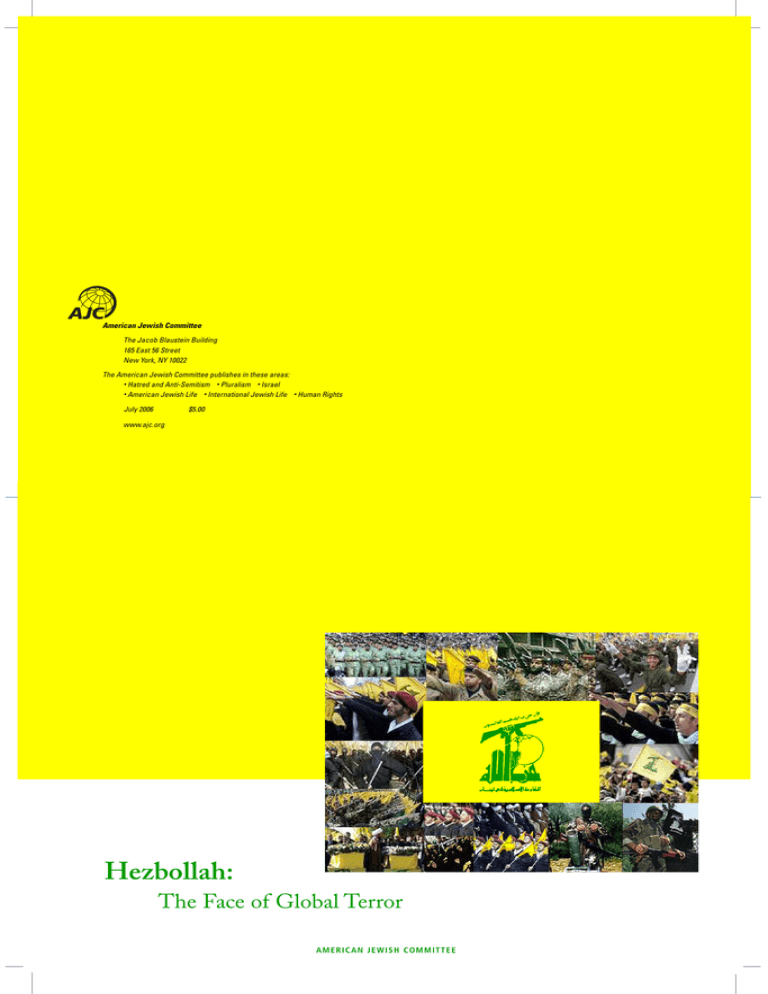
American Jewish Committee The Jacob Blaustein Building 165 East 56 Street New York, NY 10022 The American Jewish Committee publishes in these areas: • Hatred and Anti-Semitism • Pluralism • Israel • American Jewish Life • International Jewish Life July 2006 • Human Rights $5.00 www.ajc.org Hezbollah: The Face of Global Terror AMERICAN JEWISH COMMITTEE Table of Contents Introduction 2 Hezbollah’s Objectives 3 Sheikh Hassan Nasrallah in His Own Words 4 Hezbollah’s Operational Capabilities 5 The Symbol of Hezbollah 6 Major Terrorist Operations 7 Hezbollah’s Funding: Palestinian Authority 10 Iranian Support for Hezbollah 11 Hezbollah Terrorist Front Charities 12 Syrian and Lebanese Support for Hezbollah 13 Hezbollah’s International Criminal Activity 14 UN Resolution 1559 15 Al‐Manar 16 For More Information 17 Introduction Hezbollah–Arabic for “Party of God”–is a radical Islamist organization created by the Iranian government and based in Lebanon. It has a 24‐year history of attacking the West, particularly America, Israel, and Jews. It wishes to establish a Shiite theocracy in Lebanon and destroy Israel. Its ultimate goal is the establishment of Sharia (Islamic law) around the world. Iran provides Hezbollah with an estimated $100 million annually. It currently operates in several dozen countries, including in Europe, the Middle East, Asia, Africa, North America, and Latin America. The U.S. State Department designated Hezbollah as a foreign terrorist organization in 1997. Hezbollah continues to destabilize Lebanon and carry out terror attacks against Israel, across its northern border and from within the Palestinian Authority‐ruled territories. Adapted from Yehudit Barsky, Hizballah: A Mega‐Terrorist Organization, American Jewish Committee, April 2005. 2 Hezbollah’s Objectives Israel is only the beginning of Hezbollah’s targets. Its ultimate aim is world domination. “Killing is our habit. Our dignity, which is martyrdom, comes from God.”1 “If they [the Jews] all gather in Israel, it will save us the trouble of going after them worldwide.”2 “Let the entire world hear me. Our hostility to the Great Satan [U.S.] is absolute…. Regardless of how the world has changed after September 11, ‘Death to America’ will remain our reverberating and powerful slogan: Death to America.”3 “But world opinion should know that Islamic conquest is not the same as conquests by other rulers of the world…. [Non‐Islamic] conquerors want to rule the world so that they can spread through it every injustice and sexual indecency, whereas Islam wants to conquer the world in order to promote spiritual values, and to prepare mankind for justice and Divine rule.”4 [1] “Hezbollah Acknowledges Teaching Guerrilla Warfare to Palestinians,” KnightRidder/Tribune News Service, April 21, 2002. [2] “Nasrallah’s Nonsense,” New York Sun, March 11, 2005. [3] Hezbollah leader Hassan Nasrallah, at a Beirut rally in support of the Palestinian intifada, Al Manar, September 27, 2002. [4] Amir Taheri, Holy Terror: Inside the World of Islamic Terror (Adler and Adler, 1987), p. 242. 3 Sheikh Hassan Nasrallah in His Own Words Sheikh Nasrallah promotes the spread of terrorism. “Those who want to disarm the resistance [Hezbollah] by force—and we said that on several occasions—we will cut off their heads and hands and take away their souls.”1 “Two parties are fighting in Southern Lebanon,” Nasrallah explains. “[T]he highest hope of a soldier or an officer in [Israel] is to return to his family and his home, while the highest hope of an individual [in Hezbollah] is to achieve martyrdom. We have a great spiritual superiority.”2 Sheikh Hassan Nasrallah, special representative of Ayatollah Khamenei in Lebanon “[Israel is a] cancerous body in the region … [which] must be uprooted…. Jews invented the legend of the Nazi atrocities.”3 “Today, if I go on TV and in the name of Hezbollah say to the residents of the settlements of northern occupied Palestine [Israel], ‘I advise you to take to your bomb shelters within the next two hours,’ they will all [flee] to Tel Aviv.”4 [1] BBC Worldwide Monitoring, March 30, 2006. [2] “Secretary General of Hizbullah Discusses the New Israeli Government and Hizbullah’s Struggle against Israel,” MEMRI, Special Dispatch Series #36, June 23, 1999. [3] Michael Rubin, “All Talk and No Strategy: The Limits of Diplomacy,” Weekly Standard, July 24, 2006. [4] Hassan Nasrallah, Al‐Manar TV, May 23, 2006, from the Intelligence and Terrorism Information Center at the Center for Special Studies. 4 Hezbollah’s Operational Capabilities Hezbollah can call on a massive reserve of combatants and weapons. Hezbollah maintains an active force of at least 3,000 combatants and reserves of several thousand more.1 Hezbollah has an estimated 13,000 rockets/missiles in its arsenal, according to experts. These missiles can reach all of northern Israel, as we have seen, and experts believe they can hit most of Israel, including the southern city of Beersheva.2 [1] “Syria Helps Iran Arm Hezbollah,” worldnetdaily.com, November 20, 2002. [2] “Israel: New Hezbollah rockets can reach Tel Aviv and Beʹer Sheva,” Ha’aretz, http://www.haaretz.com/hasen/spages/738638.html, July 15, 2006. Hezbollah leader Sheikh Hassan Nasrallah meeting with Iranian president Mahmoud Ahmadinejad 5 The Symbol of Hezbollah The symbol of Hezbollah clearly shows the group’s extremist aims and global perspective. The Koranic verse, “Lo, the Party of God, they are the victorious ones.” AK‐47 Globe— represents Hezbollah’s desire to see its brand of Islam prevail throughout the world The letter “A” of “Allah” is linked to the upraised arm grasping the AK‐47. This signifies the ideological legitimization of the movement’s militancy as being divinely sanctioned. A Koran rests atop the letter “b” of the word “Hezb” (party), which is fashioned in the shape of a traditional lectern for the Muslim scriptures, signifying that the movement’s stances are legitimized and based on the Koran. Text reads, “Hezbollah,” or Party of God. Adapted from Yehudit Barsky, Terrorism Briefing: Hizballah, American Jewish Committee, May 2003. 6 Major Terrorist Operations Prior to 9/11, Hezbollah was responsible for more American deaths than any other terrorist organization. 1 1983: A Hezbollah truck bomb killed 63 people at the U.S. Embassy in Beirut. Seven months later, 241 U.S. servicemen were killed in the Beirut airport by another Hezbollah suicide truck bomb. 1984: A truck bomb exploded outside the U.S. Embassy annex in northeast Beirut killing 24 people. Seconds after it attacked U.S. forces, a Hezbollah truck bomb killed 58 French soldiers at the Beirut airport. Hezbollah hijacker terrorist with captain of TWA flight 847. 1985: TWA flight 847 was hijacked by Hezbollah terrorists. Dozens of passengers were held hostage for two weeks, and one American passenger was murdered. [1] Matthew Levitt, “Iranian State Sponsorship of Terror: Threatening U.S. Security, Global Stability, and Regional Peace,” February 23, 2005, at www.washingtoninstitute.org. 7 Major Terrorist Operations, Cont. Hezbollah has attacked scores of Israeli and Jewish targets around the world. 1992: Twenty‐nine were killed in the Hezbollah‐ linked bombing of the Israeli Embassy in Argentina. 1994: Hezbollah bombed the AMIA Jewish community center in Buenos Aries, killing 85 people. Hezbollah terrorists attempted to bomb the Israeli Embassy in Bangkok, Thailand. 1995: 1996: Hezbollah operatives began activity in Singapore. A Hezbollah truck bomb ripped through an apartment building in Dhahran, Saudi Arabia, killing 19 U.S. servicemen. Aftermath of Hezbollah’s attack on the AMIA Jewish community center in Buenos Aires, Argentina 8 Major Terrorist Operations, Cont. Hezbollah maintains terrorist activities around the globe. Hezbollah terrorists marching in the streets of Beirut chanting “Death to the U.S.A.” 1997: Authorities thwarted Hezbollah plans to blow up U.S. Navy ships in the Singapore Straits. 2000: Three Israeli soldiers and a traveling Israeli businessman were captured by Hezbollah terrorists. The soldiers were eventually killed by their captives. 2006: Hezbollah aided and abetted terrorists in Iraq in targeting U.S. soldiers and interests.1 [1] Daniel Byman, “Should Hezbollah Be Next?” Foreign Affairs, November/December 2003. 9 Hezbollah’s Funding: Palestinian Authority In 2004, Hezbollah‐funded Palestinian organizations were responsible for an estimated 20 percent of terror attacks against Israel. Millions of dollars were devoted to funding Palestinian terror.1 “[W]ithout the fraternal help we receive from Hezbollah, we could not continue our struggle.”2 –Zakaria Zubeidi, Al‐Aqsa Martyrs Brigades commander “[The Palestinian organizations] need financial, political, and media [propaganda] support. We do not deny that we give it to them.”3—Hassan Nasrallah, Hezbollah leader “Hezbollah supports a variety of violent anti‐Western groups, including Palestinian terrorist organizations. This support includes the covert provision of weapons, explosives, training, funding and guidance, as well as over political support.”4 –U.S. State Department [1]“UN Urges Calm Along Northern Border,” Jerusalem Post, January 11, 2005, in Barsky, Hizballah, a Mega‐Terrorist Organization, p. 4. [2] “Hassan Nasrallah Hezbollah General Secretary Publicly Admits His Organization Provides Funds for Palestinian Terror Organizations,” Center for Special Studies, May 9, 2006, quoting Welt am Sontag, March 6, 2006, www.intelligence.org.il/eng/eng_n/html/hezbollah_090506e.htm. [3] Ibid., quoting Al‐Safir, April 27, 2006. [4] United States Department of State Publication 11324, Office of Counterterrorism, April 2006. 10 Iranian Support for Hezbollah Iran is the main backer of Hezbollah—providing funds, training, political assistance, and protection. Hezbollah receives an estimated $100 million annually from Iran.1 Iranian Supreme Leader Ayatollah Ali Khamenei meets with Hassan Nasrallah, special representative of Ayatollah Khamenei in Lebanon Iran has supplied Hezbollah with military‐grade weaponry that includes long‐range, 240‐ millimeter Iranian Fajr‐3 and 333‐millimeter Fajr‐5 surface‐to‐surface missiles, wire‐guided TOW missiles and AT‐3 Sagger antitank missile, antiaircraft cannons, SA‐7 anti‐aircraft missiles, Katyusha artillery rockets, sophisticated explosive charges, and small arms.2 Iran has also provided Hezbollah with highly sophisticated weaponry including a Mohajer‐4 Iranian‐manufactured unmanned aerial vehicle (UAV), which was deployed over northern Israel in 2004.3 [1] Barsky, Hizballah: A Mega‐Terrorist Organization, p. 6. [2] “Israel: New Hezbollah rockets can reach Tel Aviv and Beʹer Sheva,” Ha’aretz, http://www.haaretz.com/hasen/spages/738638.html, July 15, 2006. [3] “Hezbollah’s UAV: An Iranian‐Supplied Drone Buzzes over Israel,” Air Force Times, November 29, 2004, in Barsky, Hizballah: A Mega‐Terrorist Organization. 11 Hezbollah Terrorist Front Charities Hezbollah is supported by a network of charities and front organizations around the world. The Al‐Aqsa International Foundation—a terrorist front organization banned by the United States, Germany and Great Britain—provides financial support for Hamas and Al‐Qaeda, as well as Hezbollah. It maintains branch offices in the Netherlands, Denmark, Belgium, Sweden, Pakistan, South Africa, and Yemen.1 Bonyad‐e Shahid, the “Foundation of the Martyr” is a front organization located in Lebanon. Since 1995, authorities believe it has raised over $50 million for Hezbollah.2 Hezbollah is reported to have received funds from U.S.‐based charities, including four in the Detroit area: the Islamic Resistance Support Association, the al‐Shahid Fund, the Educational Development Association (EDA), and the Goodwill Charitable Organization (GCO).3 [1] Matthew Levitt, “Hezbollah Finances: Funding the Party of God,” February 2005, at http://www.washingtoninstitute.org/templateC06.php?CID=772. [2] Ibid. [3] Matthew Levitt, “Islamic Extremism in Europe: Beyond al‐Qaeda–Hamas and Hezbollah in Europe,” testimony before the joint hearing of the House Committee on International Relations, Subcommittee on Europe and Emerging Threats, April 27, 2005, at http://www.washingtoninstitute.org/documents/42710d7514e2a.pdf. 12 Syrian and Lebanese Support for Hezbollah In addition to supplying it weapons, Syria provides a safe haven for Hezbollah. And through the inclusion of Hezbollah in the Lebanese government, Lebanon tacitly supports it. Syria has provided long‐range 22‐millimeter missiles. These missiles can reach northern Israeli cities, including Haifa, Afula, and Hadera.1 Damascus Airport is a key transshipment point for Iranian weapons sent from Tehran and destined for Hezbollah forces in southern Lebanon. Hezbollah currently holds twelve seats in the 128‐ seat Lebanese Parliament and two seats in the Lebanese Cabinet. (L‐r) Lebanese Parliament Speaker Nabih Berri (l), Majority Leader Saad Hariri (c) and Hezbollah chief Hassan Nasrallah “For us Lebanese, Hezbollah is a national resistance movement… If it wasn’t for them, we couldn’t have liberated our land.”2—Lebanese President Emile Lahoud [1] “Hezbollah Could Strike Israel in Case of U.S. War in Iraq,” Jordan Times, November 19, 2002. [2] CBS News, “Hezbollah: A‐Team of Terrorists,” April 18, 2003. 13 Hezbollah’s International Criminal Activity Hezbollah engages in criminal activities around the globe to raise funds for its terrorist network. Here are just two of many examples of Hezbollah’s international criminal activity: In January 2003, the U.S. Drug Enforcement Administration confirmed the existence of a Middle Eastern group in Chicago and Detroit that had organized a methamphetamine drug operation to support Hezbollah. Arrests were made in Detroit, Cleveland, Chicago, Phoenix, and several California cities. DEA officials seized $4.5 million in cash.1 Hezbollah has also used cigarette smuggling to raise funds for its activities. A cell in Charlotte, North Carolina, made a profit of between $1.5 million and $2 million before it was closed in 2004. The cell used the profits of its smuggling operation to procure the following equipment for Hezbollah: night‐vision devices, surveying equipment, global positioning systems (GPS), mine and metal detection devices, video, computer and camera equipment, advanced aircraft analysis and design software, among other items.2 [1] “Drug Money for Hezbollah,” CBSNews.com, September 2, 2002, in Barsky, Terrorism Briefing: Hizballah. [2] “Terrorism Financing,” panel one of a hearing of the Senate Judiciary Committee, Federal News Service, November 20, 2002, in ibid. 14 UN Resolution 1559 Lebanon has failed to implement UN Resolution 1559, which was adopted by the world body. As a result, Hezbollah has had it both ways—it operates with one foot inside the Lebanese political system and the other foot totally outside it. “Reaffirms its call for the strict respect of the “Reaffirms its call for the strict respect of the sovereignty, territorial integrity, unity, and political sovereignty, territorial integrity, unity, and political independence of Lebanon under the sole and exclusive independence of Lebanon under the sole and exclusive authority of the Government of Lebanon throughout authority of the Government of Lebanon throughout Lebanon….”1 1 Lebanon….” “Calls upon all remaining foreign forces to withdraw “Calls upon all remaining foreign forces to withdraw from Lebanon….” from Lebanon….” “Calls for the disbanding and disarmament of all “Calls for the disbanding and disarmament of all Lebanese and non‐Lebanese militias.” Lebanese and non‐Lebanese militias.” Israel, on the other hand, according to a report by Secretary‐General Kofi Annan, complied with Resolution 425 by successfully withdrawing from Lebanon.2 [1] UN Security Council Resolution 1559, www.un.org/News/Press/docs/2004/sc8181.doc.htm. [2] “U.S. endorses Israeli pullout from Lebanon,” CNN.com, June 18, 2000. 15 Al‐Manar Taking advantage of modern technology, Hezbollah broadcasts its radical messages on Al‐Manar satellite television. After France’s 2004 decision to ban the station, because of its unvarnished anti‐Semitic programming, the U.S. and some other countries followed suit. Nonetheless, Al‐Manar still has an estimated global daily audience of 10–15 million viewers.1 “[Al‐Manar is meant to] help people on the way to committing what you call in the West a ‘suicide mission.’ [Its videos] are meant to be the first step in the process of a freedom fighter operation.”2 – An unidentified Al‐Manar official “Al‐Manar employees conduct preoperational surveillance of potential targets and engage in other logistical and financial support activities for terrorist acts.”3 [1] Avi Jorish, “Terrorism Television: Hezbollah has a worldwide reach,” National Review Online, December 22, 2004. [2] Ibid. [3] Ibid. 16 For More Information American Jewish Committee Publications (available at www.ajc.org): Hizballah: A Mega‐Terrorist Organization Al‐Qa’ida, Iran, and Hizballah: A Continuing Synthesis Terrorism Briefing: Hizballah Counterterrorism Watch: http://ctw.ajc.org Researched and written by Maxine Kaye, Special Assistant to the Executive Director, Julia Levy, Research Assistant to Harold Tanner, and Tal Ranen, Research Associate, at the American Jewish Committee. Special thanks to Tali Green, AJC Goldman Fellow. Conceived and Supervised by David A. Harris, Executive Director, American Jewish Committee. 17 Works in this Series A Diminished World Body: An Overview of the UN and Israel (February 2006) Hatred Unmasked: Hamas Speaks (February 2006) Iran in its Own Words (March 2006) Israel in the European Media: A Case Study, 2000-01 (April 2006) Rationalizing Terrorism: A Case Study of the Immediate Aftermath of 9/11 (April 2006) How Can There Be Peace in the Middle East?: A Study of Anti-Israel and Anti-Semitic Cartoons in the Arab Media (May 2006) An Incubator of Hatred: Pervasive Anti-Semitism in MAUP, a Leading Ukrainian University ( July 2006) Over a Barrel: How America’s Dependence on Foreign Oil Endangers our National Security, Economy, and Environment ( July 2006) Hezbollah: The Face of Global Terror ( July 2006) American Jewish Committee The Jacob Blaustein Building 165 East 56 Street New York, NY 10022 The American Jewish Committee publishes in these areas: • Hatred and Anti-Semitism • Pluralism • Israel • American Jewish Life • International Jewish Life July 2006 • Human Rights $5.00 www.ajc.org AMERICAN JEWISH COMMITTEE
